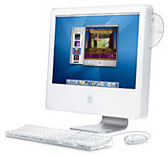The
world is wondering - does Apple + Intel make any sense at all?
Not really, some say. Intel was Apple's "enemy" for years.
Remember the snail ads? They also point out that IBM's new Cell
processor, which is to be used in the Playstation 3, is much more
advanced than any of Intel's offerings.
Others think that Apple is making a good move - after all,
remember how Apple was stuck at 500 MHz for so long? Remember how
there were 800, 900 MHz, and even 1 GHz PCs out before the Mac got
anywhere near there?
And where is the PowerBook G5?
Regardless of whether it's a good move or a bad one, Apple
needed to do something to stir some more publicity. The iPod's
already popular. The $499 Mac
mini is selling well. The MHz War is essentially over (a
1 GHz x86 and a 2 GHz x86 end up performing common tasks
with nearly the same speed as far as the user is concerned).
But if you buy a Mac now, what do you get years down the road,
especially with Longhorn (the next generation of Windows) coming to
the PC relatively soon? Apple wanted to show users and developers
that it has a clear future.
You may wonder, "Why would Apple want to announce the
partnership now, they'll just lose sales!"
 I certainly won't be buying a new
machine right now, but that's mainly because I don't need one too
badly, so I figured I might as well wait a bit. Those with systems
that have quit working or are too obsolete to run the software they
want will buy Apple hardware. The Quadra 650 wasn't completely obsolete
in 1997, three years after production was stopped, and neither will
an iMac G5 be in 2008.
I certainly won't be buying a new
machine right now, but that's mainly because I don't need one too
badly, so I figured I might as well wait a bit. Those with systems
that have quit working or are too obsolete to run the software they
want will buy Apple hardware. The Quadra 650 wasn't completely obsolete
in 1997, three years after production was stopped, and neither will
an iMac G5 be in 2008.
But what about PowerBooks? A variant of the 68040 chip did
manage to find its way into Apple's laptops, but there currently
are no G5s in Apple's PowerBook line.
Again, let me remind you that the MHz Wars are pretty much done.
In three years, sure you might be better off with a faster, used G5
desktop, but a 1 GHz G4 PowerBook should do most jobs just as
well.
If you're thinking about a Mac now, you might as well go out and
buy it. Intel's not going to be present inside all Macs for another
two years, and even then applications may have problems with the
new architecture. Your copy of Photoshop, which is optimized for G4
and G5 processors, may not run well at all. Add another few hundred
for a new copy of Photoshop if you go with an Intel-base Mac - and
you've got other software, you may need to upgrade it as well.
Why Now?
Why did Apple announce this now? Why couldn't they just wait
until they had a consumer model ready to ship?
The answer's pretty simple - they need to get people used to the
idea of Apple working with Intel. They want to make sure the rumors
are gone and get those "the world is ending! Apple has joined the
Dark Side" people to accept what's going on, even if they end up
not buying another Apple computer. (Then again, what choice do they
have? It's x86 or nothing.)
Is Intel the best path for Apple now?
It seems more logical that IBM's multithreading technology would
be better for running OS X. Then again, Apple's laptops are
popular machines, and if they can't keep up with current
technology, Apple will lose a lot of sales.
If IBM can't provide Apple with suitable technology, Apple has
to look elsewhere. If Intel can do what Apple needs, perhaps this
is the best decision right now.

 I certainly won't be buying a new
machine right now, but that's mainly because I don't need one too
badly, so I figured I might as well wait a bit. Those with systems
that have quit working or are too obsolete to run the software they
want will buy Apple hardware. The
I certainly won't be buying a new
machine right now, but that's mainly because I don't need one too
badly, so I figured I might as well wait a bit. Those with systems
that have quit working or are too obsolete to run the software they
want will buy Apple hardware. The 
